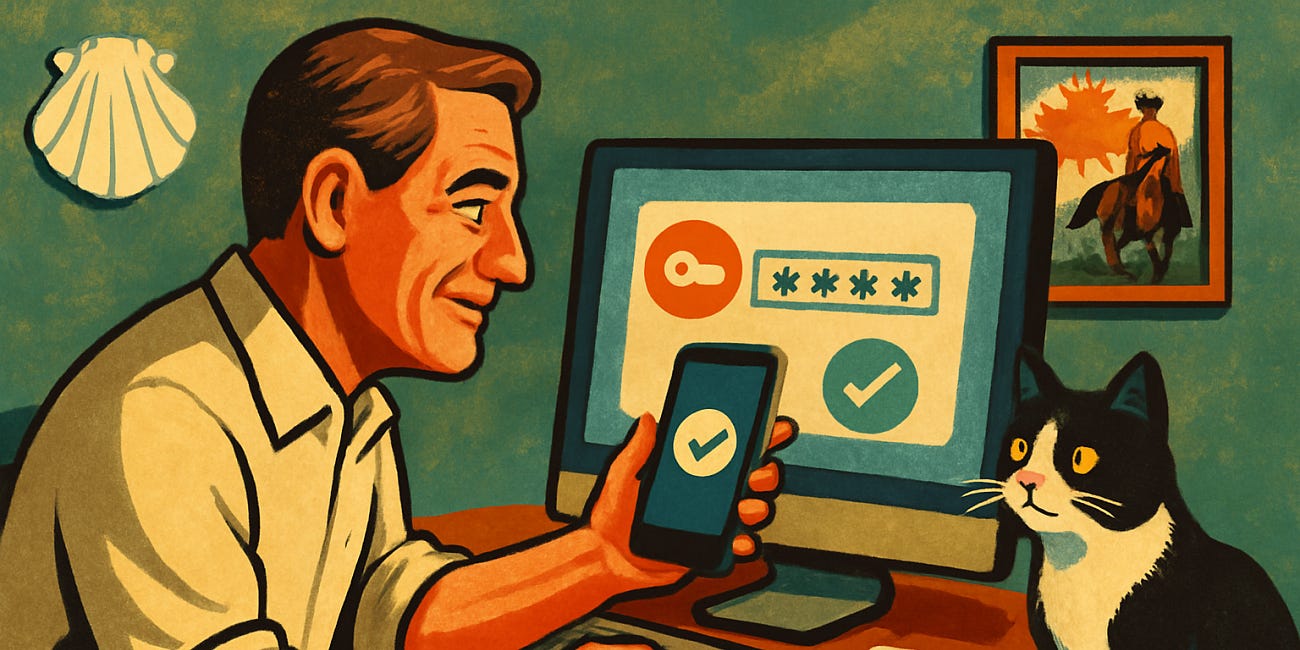Yesterday morning, I walked out of an on-the-record briefing with Jan Egeland carrying a perfect transcript of everything he said, automatically cleaned of all the "umms," coughs, and verbal stumbles that make recorded conversations hard to read. Since journalists were allowed to record, I simply started my voice recording app at the beginning of the session.
But here's where it becomes particularly helpful for those of you who don't interview humanitarian leaders. During my walk home, I opened a new recording and started talking through my article ideas. How I would weave Egeland's insights into a piece I'd already started writing for my Daybreak Notes & Beans newsletter that morning: the structure, the key quotes to use, the connections I wanted to make. By the time I reached my door, I had both a flawless interview transcript and a complete article outline waiting on my phone. If you haven’t yet subscribed to Daybreak Notes & Beans to start your day with the news, including positive news that is hard to find elsewhere these days, you can read it here:
And you can subscribe to Daybreak Notes & Beans here:
Before heading inside, I made one more quick recording: a grocery list for later in the day. Oat milk, coffee, those Norwegian crackers I can never remember the name of. Three separate voice recordings, three perfectly formatted text documents, all ready to copy and paste wherever I needed them.
Voice-to-text technology in 2025 is so advanced that it makes the old "say comma, say new line" iPhone dictation feel antiquated.
For those just joining Screen Skills, this newsletter provides practical digital advice without technical jargon. I focus on tools that give you the biggest benefit with the smallest learning curve—perfect for those who want to enhance their digital lives without turning technology into a second career.
The Quick Skill: Modern Voice-to-Text That Actually Works
Technology moves fast. Just a year ago, I was excited about basic voice dictation possibilities. Now, the tools are so good and quick that voice-to-text has become my default way of capturing thoughts, ideas, and information.
Built-in Voice Dictation (iPhone & Android - Free but Limited):
Let's briefly go back to the classic dictation (classic, as if in something revolutionary some ten years ago); this is how it works:
iPhone:
Open any app where you can type (Notes, Messages, Email)
Tap the microphone icon on your keyboard
Speak naturally, but you still need to say "period," "comma," "new line"
Works for short texts but feels clunky for longer thoughts.
Apple has been working on improving dictation with advanced machine learning and neural networks. However, there has been no specific announcement regarding the introduction of a more modern dictation system.
Android:
Open any text field and tap the microphone icon
Similar limitations - requires verbal punctuation commands
Better for quick messages than extended thinking
The Game-Changer: Letterly App (iOS/Android - $60 lifetime):
After testing Superwhisper (which was too slow for emails and short texts) and Otter (which often required recording first and then playing back for transcription), I discovered Letterly. It completely changed how I work with voice-to-text.
What makes Letterly special:
Records and transcribes simultaneously with remarkable accuracy
Automatically cleans up speech (removes "umms," false starts, verbal stumbles)
Works flawlessly even for non-native English speakers like me
Transforms casual speech into polished text instantly
Simple workflow: record, tap copy, paste into any document on any device.
My typical Letterly workflow:
Open Letterly, press record, speak naturally about whatever I'm thinking
The app processes the recording in seconds (not minutes like other tools)
Tap "Copy" on my iPhone
Switch to my MacBook, paste into whatever document I'm working on
Perfect text, ready to use
No more saying "comma" and "new line." No more waiting for processing. No more handling recordings twice.
Pro tip: Letterly works offline for private and sensitive conversations. Your voice never leaves your device unless you choose to sync across platforms. You can also use Letterly offline (I used it on a plane) to record your thoughts and ask for a transcript once you are online again.
Update May 30, 2025: Please read this newsletter’s update on Letterly’s pricing and recording time:
The Password Trick That Takes 60 Seconds But Saves Hours of Frustration
Do you regularly waste time cycling through password variations, trying to remember if you used an uppercase or lowercase letter or whether you added that exclamation mark? Believe me, I've been there too.
How This Changed My Daily Work
I've been using advanced voice-to-text technology for a few months, switching between different apps as the technology has improved rapidly. Letterly has been my daily driver for the past three months. It integrates into real work seamlessly.
Beyond interview transcription, I use it for article brainstorming during walks (like this morning's structure planning), email drafts when I'm away from my computer, quick note-taking during phone calls, grocery lists, and random reminders, as well as newsletter ideas that pop up while I'm walking.
The accuracy impresses me, especially with my Dutch accent. What used to require careful, slow dictation now works with natural, conversational speech. The speed difference matters more than I expected. When ideas come quickly, speaking them naturally rather than adapting to technology's limitations allows me to capture more complete thoughts.
I ordered the app via AppSumo for around $ 60, guaranteeing lifetime use. A lifetime in this kind of technology means that I expect to use this app extensively this year, which is why I'm willing to pay a significant amount for it. Other technologies, such as the built-in voice recording feature of smartphones, may soon catch up.
Screen Skills Community Update
It's been about three months since I launched this newsletter, and we have now reached 2,431 subscribers; thank you for being part of this growing community! Your engagement with recent productivity and technology guides continues to inspire new content.
How do you currently capture ideas when you're away from your computer? Voice memos that you never transcribe? Handwritten notes you can't read later? I'd love to hear about your current methods and any frustrations you're experiencing.
Thanks for being part of Screen Skills,
Alexander
Thank you for supporting Screen Skills with your readership. If you find these practical tips valuable, consider becoming a paid subscriber. Your support enables me to invest more time in creating content that makes technology genuinely useful, rather than overwhelming.
Did You Miss This Screen Skills Newsletter?
Why Signal Deserves Your Trust When Politicians Don't
It was early spring in the Netherlands when, between walks in the awakening forest on my island, I followed the unfolding drama in Washington. Like many of you, I was astonished, as was much of America, when "Signalgate" erupted. The revel…
And did you read today’s Daybreak Notes & Beans?










"How do you currently capture ideas when you're away from your computer?"
When inspired with an idea or line of poetry while walking, I step to the side and write it into my calendar. Getting Letterly. Thanks!
Hmmm, I capture ideas either in a small analog notebook - pen and paper style if I want to avoid picking up or unlocking my phone. At home even if I'm at my computer I have a notepad next to me where I put ideas as to not get distracted. Switching apps or even tabs is sometimes too much.
I do use speech to text but just for short ideas or tasks (I use google keep for that). I have not tried "dictating" entire newsletters or bigger ideas. I tend to rewrite everything anyway. So, I just do key words and then write it in one go. Now if my brain was organized enough to just do an entire newsletter - that could work. I'll make a note of letterly.
I'm gonna go live - audio live - on Substack and see how that works for me, hopefully this holiday weekend.
If you ever come across something that can handle Swiss German input, let me know. That could be really handy.
Thanks for this.